AMORY St. Helen, del 22 al 24 de julio, de 5 a 8 p.m. con una comida el 25 de julio. Detalles: 662-256-8392.
LELAND, El estudio de Biblia se realizará en la Iglesia Leland Presbyterian (201 Willeroy Street) del 17 al 20 de junio de 6 a8:30 p.m. Detalles: 662-686-7644.
CLARKSDALE Comunidad Católica “Náufrago”, junio 18-22. Unanse a la diversión ayudando con la decoración y a arreglar las áreas, facilitando un grupo o donando útiles. Se necesitan voluntarios. Detalles: (662) 624-4301.
GLUCKSTADT St. Joseph, “Campo Católico”, junio 11-13. Unanse a nosotros mientras nos preparamos a acampar en la creación de Dios. Se necesitan voluntarios adultos y niños en quinto grado y más adelatados para transformar nuestro espacio en un Campo Católico y para servir como consejeros/ayudantes. La lista para inscribirse como voluntario estará en la parte trasera de la iglesia. La inscripción para asistir al estudio de Biblia comenzará pronto. Detalles: contacte a Karen Worrell, kworrellcre@hotmail.com en la oficina de la iglesia, 601-856-2054.
GREENVILLE Sagrado Corazón, junio 4-8. Edades: 5-11 años o Kindergarten a sexto grado. Los que acaban de terminar el sexto grado se pueden inscribir. Detalles: oficina de la iglesia, 662-332-0891.
MADISON St. Francisco de Assisi, Vengan a bordo del “SS San Francisco” y naveguen hacia la isla de la Escuela de Vacaciones de Biblia, junio 18-22, para niños en pre-kindergarten a cuarto grado. Se necesitan voluntarios para enseñar, asistir, dirigir nuestro programa de música, decorar, trabajar en la cocina y/o cuidar a los niños. Detalles: para ser voluntario, Mary Catherine, mc.george@stfrancismadison.org.
NATCHEZ Basilica Santa María, “Náufrago”, junio 4-8, de 8-11:30 a.m. Edades (debe haber completado el PreK3) – quinto grado. Costo: $20 por niño y $10 por cada niño adicional. Detalles: jessicastubbs@gmail.com, oficina de la iglesia, 601-445-5616, o para registrase visite: https://vbspro.events/p/events/stmarynatchez.
PEARL San Judas, “Alrededor del mundo en 5 dias!” junio 11-15, de 9 a.m. – mediodia, edades de tres años a sexto grado. Sugerencia de donación: $5 por niño. Se necesitan voluntarios: los que entran al séptimo grado hasta el 12 grado. Detalles: Stacy Wolf, ccd@stjudepearl.org, 601-939-3181, o visite en Facebook a la Iglesia San Judas.
Author Archives: Tereza Ma
Sacramento de primavera
 Mississippi Católico también publicará una edición de sacramentos en julio. Esto significa que necesitamos tus fotos de Primera Comunión y confirmación. Esta es su única oportunidad de enviar fotos grupales propuestas a Mississippi Católico. Envíe fotos y la lista de los nombres por correo electrónico a editor@mississippicatholic.com. Todas las fotos deben ser recibidas antes del viernes, 6 de julio.
Mississippi Católico también publicará una edición de sacramentos en julio. Esto significa que necesitamos tus fotos de Primera Comunión y confirmación. Esta es su única oportunidad de enviar fotos grupales propuestas a Mississippi Católico. Envíe fotos y la lista de los nombres por correo electrónico a editor@mississippicatholic.com. Todas las fotos deben ser recibidas antes del viernes, 6 de julio.
Los mejores graduados: necesitamos tu información
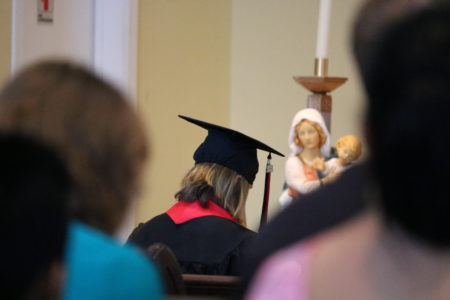 Mississippi Católico está comenzando a producir la edición especial de graduación de este año. Si un alumno de su parroquia es “Valedictorian” o “Salutatorian” de su escuela secundaria o si alguien en su parroquia recibe un honor especial de su escuela secundaria, nos gustaría incluirlos en la edición. Del mismo modo, si su parroquia honra a sus graduados, nos encantaría una foto con los nombres y las escuelas para esta edición. Envíe toda la información a Maureen Smith, editora a maureen.smith@jacksondiocese.org antes del viernes 1 de junio.
Mississippi Católico está comenzando a producir la edición especial de graduación de este año. Si un alumno de su parroquia es “Valedictorian” o “Salutatorian” de su escuela secundaria o si alguien en su parroquia recibe un honor especial de su escuela secundaria, nos gustaría incluirlos en la edición. Del mismo modo, si su parroquia honra a sus graduados, nos encantaría una foto con los nombres y las escuelas para esta edición. Envíe toda la información a Maureen Smith, editora a maureen.smith@jacksondiocese.org antes del viernes 1 de junio.
Sagrada orden
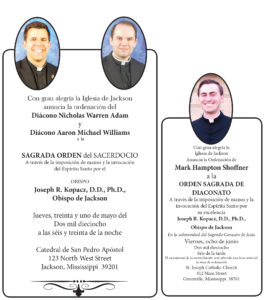
Evento sobre vocaciones examina variedad de oportunidades
Por Veronica Lopez
GREENWOOD – El sábado 21 de abril, la Oficina del Ministerio Hispano y la Pastoral Juvenil Hispana reunieron a un pequeño grupo de jóvenes y adultos hispanos de Tupelo, Jackson, Canton, Greenville y Greenwood para un evento sobre las vocaciones. La reunión, realizada en el Centro de Retiros Locus Benedictus, fue parte de la respuesta de la oficina al proceso del plan pastoral para mostrar que las vocaciones son un tema importante para la comunidad.
“Tuvimos un orador de Argentina que nos ayudó a entender los pros y los contras de la generación del milenio y cómo conocernos a nosotros mismos para poder guiar mejor nuestro proceso de discernimiento.
Por la tarde, un panel vocacional compartió sus experiencias y testimonio, dijo Verónica López, coordinadora del ministerio de jóvenes adultos hispanos. “El panel estaba compuesto por una pareja casada, un hermano religioso, un religioso franciscano, una hermana religiosa, el seminarista César Fermín, una mujer laica y un sacerdote redentorista,” continuó. Este grupo representa un espectro completo de oportunidades vocacionales diverso y ayudó a los jóvenes a darse cuenta que hay diferentes caminos para explorar.
Todas las charlas se enmarcaron en torno a cómo el misterio pascual tiene el potencial de encender en cada persona una llamada auténtica a la vocación. Se alentó a los participantes a hacer preguntas y contribuir a la conversación.
Roberto Zapata de la Catedral de San Pedro Apóstol dijo que se sintió animado a escuchar que Dios tiene una vocación planificada para cada persona. “Lo que me sorprendió fue que cada uno de los que asistimos dio puntos de vista diversos y nos encontramos más como jóvenes”, dijo.
Byron López de la parroquia Sagrado Corazón en Canton dijo que ahora se siente más preparado para hablar sobre las vocaciones en su propia comunidad. “Regreso con un amplio conocimiento sobre las vocaciones para compartir con otras personas y jóvenes para que ellos también tengan conocimiento sobre sus vocaciones. Estoy consciente de que puede ayudarlos en enormes cantidades,” dijo. Dulce Basurta, otra feligresía de Sagrado Corazón dijo que le gustaba escuchar cómo los asistentes viven su fe a través de sus vocaciones en sus vidas diarias.
Obispos mexicanos prometen nuevo enfoque pastoral acompañando a la gente
Por David Agren
CIUDAD DE MÉXICO, Mex. – La conferencia episcopal mexicana ha prometido buscar una nueva visión pastoral en la cual la iglesia es considerada cercana a las necesidades de la gente, los pobres son la prioridad y los prelados se expresan proféticamente en asuntos como la violencia, la desigualdad y la corrupción entre las élites que actualmente cuentan con la jerarquía como aliados.
La conferencia presentó su plan pastoral el 13 de mayo diciendo que este responde al estado actual del país y a los cambios sociales. El plan también responde a la amonestación del papa Francisco, quien regañó a los obispos de México en 2016 por descansar en sus laureles, mostrar timidez mientras la violencia aumentaba y no poder encontrar unidad entre ellos.
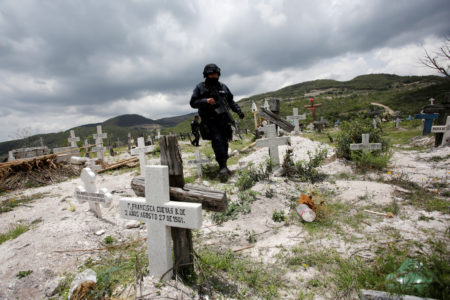
A federal policeman keeps watch at a cemetery as relatives of missing persons look for mass graves in Ahuihuiyuco, Mexico, May 10. (CNS photo/Daniel Becerril, Reuters)
“Reconocernos que ser iglesia pueblo, trae consigo la necesidad de ajustar y actualizar nuestros conceptos teológicos y asumirlos en sus consecuencias prácticas, tanto personalmente, como al interior de la vida de nuestras comunidades cristianas.”, dice el documento de los obispos, titulado Proyecto Global de Pastoral 2031-2033. Las fechas coinciden con el quinto centenario de las apariciones de Nuestra Señora de Guadalupe, santa patrona del país, a san Juan Diego y con el segundo milenio de la resurrección de Cristo.
“Actitudes de individualismo, celos pastorales, pretensiones principescas, arrogancia, soberbia y comportamientos que contradicen una vida de comunión y participación, ya no tienen lugar en la vida de la iglesia pueblo”, dijeron los obispos.
Según los datos del censo, aproximadamente el 83 por ciento de los habitantes del país todavía se identifica como católico, algo que un editorial de la Arquidiócesis de México señaló al cuestionar el regaño del papa a los obispos de México y preguntaron quién lo asesoró sobre el discurso.
Sin embargo, la conferencia episcopal tomó el discurso como un llamado a la acción. Su documento se expresó con candor y tristeza de que un país tan católico y tan fervoroso en su fe pueda experimentar tanta violencia y tolerar altos niveles de desigualdad y corrupción.
Las medidas contra los carteles de la droga, comenzadas hace 11 años, han cobrado más de 200,000 vidas y han dejado más de 30,000 desaparecidos. Aunque México ha superado la gobernación de un solo partido, la percepción de corrupción ha aumentado aun cuando el país se volvió más democrático.
A menudo los obispos han preferido no hablar sobre temas complicados o controversiales, parcialmente por riesgo que corren si dicen algo. Sacerdotes están entre las víctimas de la violencia. A veces los obispos han comentado solamente después que el gobierno haya hablado primero.
“Lamentamos profundamente la desaparición y muerte de miles de jóvenes en los últimos tiempos, los feminicidios, verdaderos ríos de sangre nueva que han corrido por nuestros pueblos y ciudades”, dice el documento.
“La introducción de una narcocultura en nuestra sociedad mexicana, de conseguir dinero rápido, fácil y de cualquier forma, ha venido a dañar profundamente la mente de muchas personas”, dice el documento, añadiendo que hay factores que han afectado la situación como “la pérdida de valores, la desintegración familiar, la falta de oportunidades, los trabajos mal remunerados, la corrupción galopante en todos los niveles, la ingobernabilidad, la impunidad”.
El documento de los obispos ofrece momentos de autocrítica, incluyendo el reconocimiento de que ellos no han atendido suficientemente el abuso sexual por clérigos. El propio comportamiento de los obispos se mencionó con el reconocimiento de que “en algunos momentos parecemos más jueces, dueños o líderes de una estructura humana que agentes dóciles al Proyecto del Reino de Dios”.
Los obispos añadieron: “Vemos con inquietud que nuestro pueblo reclama un mayor acompañamiento espiritual y un especial coraje profético frente a las circunstancias actuales”.
Otros defectos reconocidos incluyen su trabajo con las poblaciones indígenas, con los jóvenes y con los residentes urbanos. Muchos de estos últimos se han mudado de los sectores aislados pobres de México en busca de oportunidades pero “perdiendo sus raíces”, sufriendo exclusión y viviendo la explotación.
“La iglesia se ha visto rebasada para atender y acompañar a esta multitud desamparada”, dice el documento.
La piedad popular se ha arraigado en muchas partes de México, mientras que muchos de los bautizados entienden poco sobre el credo.
“Hay un analfabetismo religioso preocupante en un gran número de creyentes”, dijeron los obispos. “Esto se manifiesta en la superficialidad de sus compromisos sacramentales y en la ligereza de la vivencia de los valores del Evangelio en su vida diaria”.
El nuevo plan pastoral presentó 193 observaciones acerca del estado de las cosas en México, pero también acciones para la iglesia mexicana. Los obispos se comprometieron a defender los derechos humanos, proteger a los migrantes e incorporar “la doctrina social de la iglesia … en la formación de los agentes de pastoral”.
El documento también prometió dar acompañamiento para los que practican la piedad popular y también para las víctimas de la violencia, promover la participación en los sacramentos con énfasis en la Eucaristía y ser “una iglesia incluyente donde se acoja con misericordia a esposos vueltos a casar, homosexuales, madres solteras, ancianos, indigentes y migrantes, entre otros”.
Not just what you see: Some issues behind the Israel-Palestinian violence
By Judith Sudilovsky
JERUSALEM (CNS) – A Sometimes, news is not just what meets the eye on the TV screen or a social media post.
Catholic political analyst Wadie Abunasser noted that while neither Israel nor the Palestinian political movement Hamas is interested in starting a war at the moment, both are interested in delivering strong messages to the other side on various issues being negotiated through backdoor channels. Internal politics also contribute to the situation, he said.
One issue on the table, he said, is a prisoner exchange being negotiated by the Egyptians. The exchange involves the bodies of two Israeli soldiers held by Hamas since the last Gaza war and three Israeli civilians – an Israeli-Ethiopian and two Israeli Bedouin – held by Hamas. All three civilians crossed into Gaza willingly, and two have mental health issues.
“(Israel and Hamas) are trying to press each other, and there is no real mutual understanding,” said Abunasser, director of the International Center for Consultations in Haifa. “What I am afraid of is not a prepared war, but of incidents getting out of hand if this continues.”
Egyptian negotiators are also at work trying to calm the current situation, he said.
The demonstrations were first called to protest the U.S. embassy move to Jerusalem, and to mark the 70th year since al-Naqba, or what Palestinians call their catastrophe – the creation of the State of Israel.
“We are talking about two neighbors who dislike each other,” said Abunasser.
The status of Jerusalem was one of the issues to be discussed when the two sides finally returned to the negotiating table, and neither side was to take unilateral action, he said. Though it was the U.S. decision to move the embassy, Israel is seen as having lobbied strongly for it and for the relocation of other embassies as well.
“The fact that (U.S. President Donald Trump) is downgrading and avoiding any relations is bringing the Palestinians to a very embarrassing situation. They are basically boycotting the USA and have brought back their representative from Washington,” Abunasser said. “Many people believe Trump is not a good friend of Israel. He is pretending (to be), but he is causing more problems than solutions.”
Abunasser also said internal Palestinian politics is playing a role in the growing tensions. Palestinian President Mahmoud Abbas has been cutting funds to Gaza, which is under control of Hamas, Abbas’ rival. Abbas wants to force the Hamas leadership to comply with his conditions for reconciliation, said Abunasser.
“So Hamas is trying to kill two birds with one stone. They are pressing back on Israel … (about) concessions to Hamas on the prisoner exchange, and Hamas is pressing against the Palestinian Authority (with the protests) and, if people are killed, the PA has to pay (their families),” he said. “Hamas, Israel and the PA are fighting each other until the last Gazan. It is very sad, really.”
He said 2 million people live in the cage known as Gaza, which has been blockaded for 11 years, since Hamas took control there. Much of the infrastructure of Gaza has been destroyed by the Israeli military.
Abunasser said Hamas does not want to risk Gazans taking out their anger on political leaders, so it is trying to divert the anger instead toward Israel. Gazans are pawns in the confrontation, he said.
Numerous children have been killed in the demonstrations, including an 8-month-old baby, who died of tear gas inhalation.
While Palestinians have been calling the protests “peaceful,” Hamas leader Salah Bardawil was shown on Palestinian TV saying that of 62 people killed in the Gaza demonstrations, 50 were from Hamas, which is listed as terrorist group by Israel, the U.S. and the European Union. More than 2,000 people have been injured in the demonstrations.
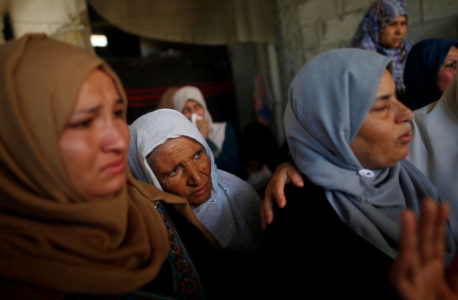
Relatives in the Gaza Strip mourn a Palestinian killed at the Israel-Gaza border May 16. (CNS photo/Mohammed Salem, Reuters)
Israel has been criticized by the international community for its use of snipers and live fire against the demonstrators. Israel says its soldiers are trying at all costs to prevent Palestinians who would carry out terrorist attacks against Israeli targets from crossing into Israel.
Israel also says millions of dollars of damage has been caused to Israeli crops as Palestinians send kites with Molotov cocktails flying over the border fence, burning agricultural fields.
Abunasser said Israelis along the border live under constant tension of such possible attack. Numerous underground Hamas tunnels leading from Gaza into nearby Israeli communities have been destroyed by the Israeli in the past, making the fear of infiltration very real.
Gazans, said Abunasser, are under the constant tensions of the blockage, electricity shortages, no work, a lack of commodities and the inability to leave.
“People live on a day-by-day basis. But the Palestinians have it worse. In Israel there is a functioning government, and if there is a war, farmers will be compensated by the state. They can escape to the north,” he said. “Gaza Palestinians have no place to escape, financially or physically.”
Pentecost and the Poor People’s Campaign
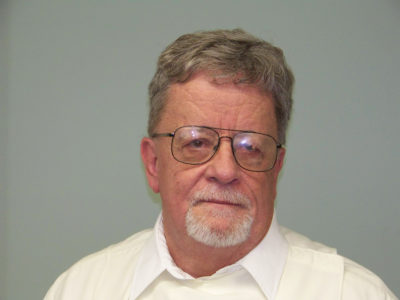
Father Jeremy Tobin
Millennial reflections
By Father Jeremy Tobin, O.Praem
We have celebrated the core of our faith: the death and resurrection of Jesus Christ. We now come to the end, the great Feast of Pentecost. We hear the Prophet Joel cry out, “I will pour out my spirit on all flesh!” Remember Jesus reading that passage in the synagogue in Nazareth?
Bishop John Botean’s commentary in the previous edition of Mississippi Catholic inspired me to reflect further on the work of the Holy Spirit in the church even today. Bishop Botean comes from the Romanian Catholic Church, one of the Eastern Byzantine Churches in communion with the Pope. He commented on the theology of Baptism as developed by Rev. Alexander Schmemann, dean of St. Vladimir Orthodox Seminary in New York. His column compared the Eastern Church’s treatment of the Holy Spirit to Quakers.
He described Quaker meetings where they sit in a church and focus on the Spirit’s presence and what it would prompt them to do. He ends by saying “The emphasis given to the Holy Spirit in Byzantine theology is explicit, but different than the Charismatic movement. He quotes Father Schmemann’s response to the oft asked question “Is Jesus Christ my personal savior?” His response is, “Jesus Christ is the savior of the world. The Holy Spirit is my personal savior, because “No one can say, Jesus is Lord, except by the Holy Spirit.” (1 Co. 12:3).
The Eastern Church has a rich theology around the Holy Spirit. They emphasize the Holy Spirit is at work in the sacraments (they call them mysteries) allowing for the movement of the heart and feelings in response to God. Barriers are lifted and people of faith follow where the Spirit leads.
This leads us right into Pentecost and the great conclusion to the season of Easter. Down through the ages the Holy Spirit leads and guides the Church, calling people to lead others to specific ways to live the Gospel, even to our own time. We have seen prophetic figures such as Dr. Martin Luther King, Jr., and Bobby Kennedy, rise up and lead us to greater possibilities of freedom and hope. They gave their lives in the cause of justice and freedom, but the cause remains active. We celebrate his year the 50th anniversary of Martin Luther King’s Poor People’s Campaign Mule Train that went from Marks, Mississippi to Washington, D.C. to protest the evils of war, racism and income inequality.
The Spirit continues to move us forward even when the resistance to change intensifies. I think of Rev. William Barber of North Carolina. When he preaches he reminds me a lot of Dr. King. His use of scripture to illustrate social justice connects modern issues is to a higher, moral level. Rev. Barber has resurrected the Poor People’s Campaign. Reflecting the style of Dr. King, He says “There is something wrong in America!”
Society must be made aware, as the campaign points out, that “People should not live or die from poverty in the richest nation ever to exist. Blaming the poor and claiming that the United States does not have an abundance of resources to overcome poverty are false narratives used to perpetuate economic exploitation, exclusion and deep inequality.” This reflects the 72nd Psalm, “The Lord hears the cry of the poor.” Another principle, “We recognize the centrality of systemic racism in maintaining economic oppression must be named, detailed and exposed empirically, morally and spiritually. Poverty and economic equality cannot be understood apart from a society built on white supremacy.”
These are but two of twelve fundamental principles to form a moral movement, a moral revival. From now until June 23, people will carry out sustained nonviolent actions in some 30 states, hoping to break through toxic attitudes and shift the moral narrative.
I end with a passage from Isaiah 10 which captures the spirit: “Woe unto those who make unjust laws, to those who issue oppressive decrees, to deprive the poor of their rights, and withhold justice from the oppressed of my people, making widows their prey, and robbing the homeless child.”
(Father Jeremy Tobin, O.Praem, lives at the Priory of St. Moses the Black, Jackson.)
School shooting should impact election
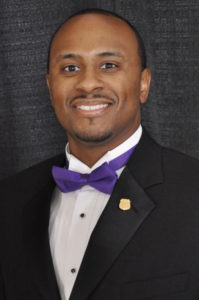
Will Jemison
Keeping our faith
By Will Jemison
As of the writing, we have lost at least another 10 innocent souls to senseless gun violence at an American school. I’m certain the calls to prayer and self-reflection from many of our legislators will commence and in about a week, we will have moved on to other issues in the country. What can’t be achieved in that week’s time is the healing that will be needed for the parents and friends of the indirect victims of the National Rifle Association’s (NRA) stronghold on some of our elected officials from many statehouses all the way up to the top seats in our federal government.
As Catholics, our social doctrine teaches us that all lives are imbued with dignity and should be protected. Obviously, we send our prayers and thoughts to those who have died, and with current laws, will continue to lose their lives to senseless gun violence due to lax gun laws, but prayers aren’t enough. In addition to our belief in the dignity of life, we also are charged with ensuring that policies and laws that are in effect don’t allow for mentally ill, violent and irresponsible individuals to have free access to weapons.
For the last few years, I’ve attended the annual pro-life events across the state where organizations recognize the works they have done in the arena of abortion legislation and pro-life advocacy. Indeed, many have performed some positive works in exposing the alternatives to abortion that some expectant mothers and fathers had not considered or weren’t aware of, but what has struck me most is the apparent lack by these same groups to effectively advocate either at the local level or statewide to reverse the scourge of the pro-gun movement in this state. Is equipping individuals with unnecessary weapons a legal right or a tool to ensure that some voters are appeased at the cost of endangering others?
In the past few years, we have witnessed innocent children and adults slaughtered in places of worship, schools and offices across the country; yet, we haven’t witnessed any substantive change to the laws that govern how we obtain access to weapons of any sort. As Catholics, we should be concerned. From 1994 to 2004, our elected officials attempted to band-aid the wound of gun violence by banning the sale of assault weapons similar to those used in most of our mass shootings. The problem with the ban was that it only outlawed the sale of new weapons, not the many thousands of assault weapons that were already in circulation and were sold via direct, cash transactions between individuals.
With an upcoming statewide election looming, it’s imperative that we as Catholics exercise our right to advocate and participate in the electoral process to affect positive change. There simply is no justification for individuals to have the right to openly carry weapons in public places throughout this state or casually purchase assault weapons. The intent of open carry laws are to intimidate some and appease others and no child or parishioner should have to be concerned whether it’s safe to attend school or church for fear of someone possibly hurting them or worse, due to our ineffective leadership.
Mississippi’s upcoming elections will be a great test of our fortitude as socially conscious voters and Catholics. At our moral and religious core is the desire to do what’s right and just, will this next round of elections reflect this or will we allow a few self-serving political issues deflect us yet again? It’s time we challenge our elected leadership to act in the best interests of the many and to place a higher value of life for all people and in all stages of life, from conception to natural death.
(Will Jemison is the coordinator for Black Catholic Ministry for the Diocese of Jackson.)
Summer movie season starts with spring kick-off
By Catholic News Service
NEW YORK (CNS) – The following are capsule reviews of movies recently reviewed by Catholic News Service.
“Can we please stop saying sex?” a character asks in the ensemble romantic comedy “Book Club” (Paramount). The answer, in a word, is no.
In fact, there’s hardly a line of dialogue in director and co-writer Bill Holderman’s film, penned with Erin Simms, that doesn’t contain an innuendo, a smutty pun or some other tiresome joke. A listless cat’s visit to a veterinarian and the refurbishment of a motorcycle are both made the occasion for extended off-color wordplay, while the use of Viagra in ill-chosen setting results in a series of cringe-worthy visuals.
Such elements are all the more embarrassing given the movie’s stellar veteran cast. That these pros are going to find themselves flailing around in a morass of bad taste becomes apparent as soon as the premise is known: A group of friends, all ladies of a certain age, find their interest in amour renewed after their book club takes on E.L. James’ sadomasochistic “Fifty Shades” trilogy.
And so, they’re off to the races, each in her own way. Timid recent widow Diane (Diane Keaton) who suffers from fear of flying, falls, ironically enough, for wealthy pilot and aeronautics researcher Mitchell (Andy Garcia). But Diane’s path to happiness is blocked by the patronizing attitude of her duo of over-solicitous daughters, Jill (Alicia Silverstone) and Adrianne (Katie Aselton).
Promiscuous, emotionally detached hotel owner Vivian (Jane Fonda) reconnects with Arthur (Don Johnson), the ex whose proposal she long ago turned down. Though she increasingly regrets her decision, reintegrating the physical and emotional aspects of love may take some work.
Buttoned-up federal judge Sharon (Candice Bergen) has yet to get over her divorce from Tom (Ed Begley Jr.), despite the fact that it’s been 18 years since they split. But, apparently inspired by the kinky connection she and the others have been reading about, she tries an online dating service and promptly meets George (Richard Dreyfuss). He’s so obviously her soulmate that they follow up their first meal together by going for it in the back seat of her car.
Meanwhile, married couple of many years Carol (Mary Steenburgen) and Bruce (Craig T. Nelson) struggle to reignite the faltering flames of their mutual passion.
“Book Club” crusades relentlessly for an aging woman’s to satisfaction in the bedroom – or the back seat – without regard to marital status or any other circumstance. Only Vivian’s tilt away from her licentious past and Carol and Bruce’s commitment to fidelity partially retrieve the lowminded proceedings.
The film contains a misguided view of human sexuality, an offscreen premarital encounter, implied cohabitation, pervasive sexual humor, including an extended tasteless sight gag, several profanities and milder oaths and at least one rough and a couple of crude terms. The Catholic News Service classification is L – limited adult audience, films whose problematic content many adults would find troubling. The Motion Picture Association of America rating is PG-13 – parents strongly cautioned. Some material may be inappropriate for children under 13.
“Black Panther” (2018)
Sprawling, energetic but ultimately overlong Marvel Comics adaptation from director and co-writer Ryan Coogler. The young sovereign (Chadwick Boseman) of an imaginary – and secret – African kingdom where the use of a super-powerful mineral has enabled the population to achieve both prosperity and a range of technological wonders unknown to the outside world must cope with two principal threats to his realm. The first involves a South African arms dealer (Andy Serkis) who has managed to infiltrate the nation and make off with a stock of the mineral which he aims to sell to the highest bidder. The second concerns the ongoing consequences of a long-ago family conflict (involving Michael B. Jordan). The king is aided by his tech-savvy sister (Letitia Wright), the woman (Lupita Nyong’o) he would like to make his queen, the leader (Danai Gurira) of his army’s band of fierce female warriors and, eventually, by a CIA agent (Martin Freeman). Real-world political preoccupations are incorporated into this sci-fi tinged action adventure while plot developments weigh vengeance against justice and violent revolution against peaceful reform. Possibly acceptable for older teens. Nonstructural religious ideas and practices, much stylized violence with minimal gore, several crude and at least one crass term, an obscene gesture. Spanish language and titles options. The Catholic News Service classification is A-III – adults. The Motion Picture Association of America rating is PG-13 – parents strongly cautioned. Some material may be inappropriate for children under 13. (Walt Disney Studios Home Entertainment; also available on Blu-ray)
“Mastermind” (1976)
Comedy misfire filmed in Japan with Zero Mostel as a Kyoto police inspector investigating a series of murders involving an android doll (Felix Silla), Nazi war criminals, Israeli agents, an American spy (Bradford Dillman) and a nightclub owner (Keiko Kishi). Directed by Alex March, the disjointed proceedings make little sense, the comedy is flat and the inspector’s recurring daydream of being a samurai superwarrior is tiresome. Stylized violence and sexual innuendo. The Catholic News Service classification is A-II – adults and adolescents. The Motion Picture Association of America rating is G — general audiences. All Ages Admitted. (Kino Lorber Studio Classics)
“Samson” (2018)
Spirited biblically based drama in which the super-strong champion (Taylor James) of the oppressed Israelites skylarks with his younger brother (Greg Kriek), romances a Philistine gal (Frances Sholto-Douglas) but also tangles with the wicked prince (Jackson Rathbone) who embodies that people’s tyrannical and exploitative rule over the occupied Promised Land. As Samson mows down his foes, with femme fatale Delilah (Caitlin Leahy) waiting in the wings, director Bruce Macdonald follows the formula of golden-age Hollywood adaptations of the Good Book with large-scale battles, a love angle and an effete villain. Though some of the necessary expansion on the Old Testament account fails to convince, this is generally an enjoyable riff on the Hebrew he-man’s story. While not suitable for the youngest viewers, it can provide a fine introduction to the subject for teens. Much combat violence with little gore, a scene of torture, references to prostitution and womanizing. Spanish language and titles options. The Catholic News Service classification is A-II – adults and adolescents. The Motion Picture Association of America rating is PG-13 – parents strongly cautioned. Some material may be inappropriate for children under 13. (Universal Studios Home Entertainment; also available on Blu-ray)
“First Reformed” (A24)
This drama about a Protestant minister (Ethan Hawke) in upstate New York has quite a bit to say about religious belief, environmentalism, grieving, alienation, rage, the power of love and the corruption of religion by money and power. Writer-director Paul Schrader does not condescend to belief, but is interested in launching discussions about what faith means and what actions best express it. Some gore, mature themes, fleeting scatological references. The Catholic News Service classification is A-III – adults. The Motion Picture Association of America rating is R – restricted. Under 17 requires accompanying parent or adult guardian.
“Life of the Party” (Warner Bros.)
Anemic comedy in which middle-aged mom Melissa McCarthy (who also co-wrote the script) is dumped by her husband (Matt Walsh) in favor of the hard-edged real estate agent (Julie Bowen) with whom he has been having an affair and decides to get a fresh start by returning to the university she dropped out of in order to have her now-grown daughter (Molly Gordon) who is also currently a student there. Her kindly, upbeat manner makes her the toast of her daughter’s sorority and wins her the heart of a handsome fraternity brother (Luke Benward). Everything about director and co-writer Ben Falcone’s star vehicle for his wife McCarthy rings false, including its affirmations of maternal and filial affection and its rounds of mutual feminine confidence building. Frivolously treated offscreen nonmarital and marital sexual activity, some of it in semi-public places, unintentional drug use, comic brawling, sexual and anatomical humor, a couple of crude and numerous crass terms. The Catholic News Service classification is A-III – adults. The Motion Picture Association of America rating is PG-13 – parents strongly cautioned. Some material may be inappropriate for children under 13.
